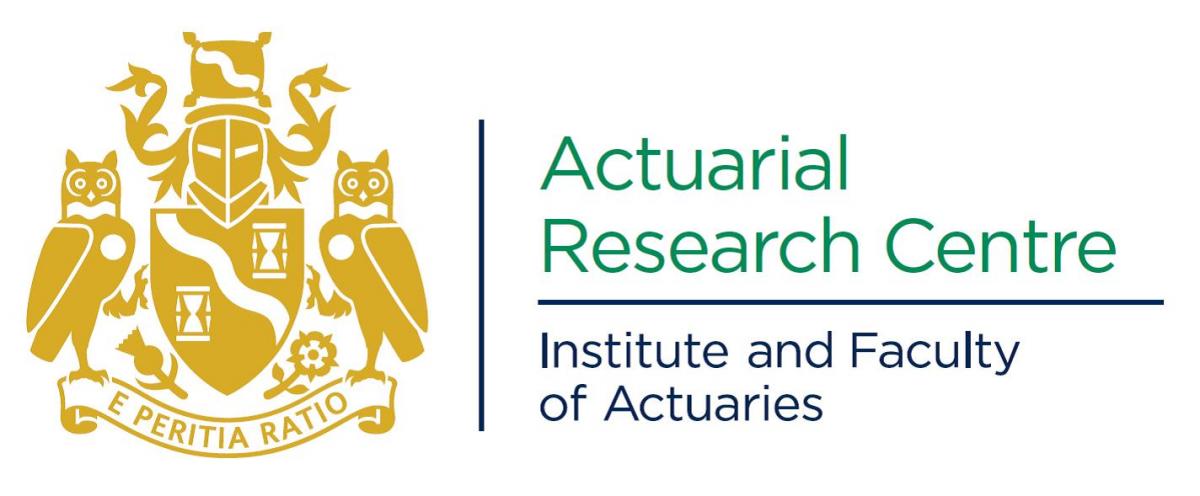
Exploring the most significant challenges in actuarial science
The Actuarial Research Centre (ARC) has developed a programme of webinarsshowcase the results from their cutting-edge research programmes, addressing some significant challenges in actuarial science. The series consisted of webinars, covering all of the ARC's main research programmes:
- Behavioural Aspects of Institutional Investment Decision-Making
- Use of Big Health and Actuarial Data for understanding Longevity and Morbidity
- Modelling, Measurement and Management of Longevity and Morbidity Risk
- Optimising Future Pension Plans: Phase II
- An Analysis of Diabetes Mortality and Morbidity Risk
On this page you will find recordings of previous events available to you to watch on-demand.
Next Event: Events as part of the ARC Webinar Series 2022 are now open for registataion. Find out more.
Follow us on LinkedIn to be the first to hear about our events!
Mortality inequality: what insights can we gain from cause of death data?
21 October 2021
Recent research has highlighted significant inequalities in mortality and life expectancy by socio-economic group; differences that have come further under the spotlight during the Covid-19 pandemic.
In this webinar, we will discuss how cause-of-death data from the Office for National Statistics can help us to understand how inequalities arise at the all-cause level. The key to understanding mortality inequality is to think about the chain that connects risk factors, relative risks, and cause-of-death mortality through to all-cause mortality. Mortality inequalities arise when the prevalence of specific risk factors varies significantly between geographical and socio-economic groups and where these risk factors have high relative risk associated with specific causes of death.
Risk factors that can be considered to be controllable by the individual (e.g. smoking) rather than preventable (e.g. Human Papilloma Virus) or not preventable (e.g. genetic variations) are much more likely to be associated with mortality inequality.
We will discuss how cause-of-death mortality varies by region and deprivation group and also by Clinical Commissioning Group (CCG) across England. And, with reference to specific causes, we will gain insights into how specific risk factors vary between groups and through time alongside other factors such as medical advances.
We will conclude with some discussion of the potentially disruptive effect of Covid-19 on cause-of-death data.
Speakers: Professor Andrew Cairns
Chair: Joseph Lu
Further information
- A recording of the webinar is available on YouTube and is also available for members on the IFoA's Virtual Learning Environment (VLE).
- View the slides from the webinar
- Find out more about the presenters
- Find out more on ARC's Modelling, Measurement and Management of Longevity and Morbidity Risk programme
Modelling cancer risk: regional and socioeconomic disparities
30 September 2021
Cancer incidence and mortality vary by region and socioeconomic status. Modelling the structure development and trends of cancer risk is important for insurance purposes and can impact pricing and reserving in related health insurance fields such as critical illness insurance and care provision.
In this work we investigate cancer rates over the period 2001-2018 to quantify differences among regions and deprivation groups in England, using data from the Office for National Statistics. Under a comprehensive Bayesian model, which accounts for uncertainties in the data, we provide a detailed assessment of regional and socioeconomic disparities in cancer morbidity and mortality risk. The analysis shows considerable inequalities in some of the most prevalent types of cancer, as well as all-cancer rates, with respect to socioeconomic status by region. It also reveals that the gap among deprivation groups with the highest and lowest cancer rates has widened over time for certain types of cancer. Our research has also found that delays in the average age of cancer diagnosis can result in a significant increase in cancer mortality, that also exhibits regional variation. This can be particularly relevant to diagnosis delays under the current Covid-19 pandemic.
The work discussed in this webinar is part of the Modelling, Measurement and Management of Longevity and Morbidity Risk programme.
Speakers: Professor George Streftaris and Dr Ayşe Arık
Chair: Jamie Funnell
Further information
- A recording of the webinar is available on YouTube and is also available for members on the IFoA's Virtual Learning Environment (VLE).
- View the slides from the webinar
- Find out more about the presenters
- Please find below links to papers related to this topic:
- Find out more on ARC's Modelling, Measurement and Management of Longevity and Morbidity Risk programme.
Modelling Neighbourhood Mortality Using the Random Forest
August 2021
This webinar introduces and explains the random forest algorithm in simple language and with interpretable example. We then explain how the algorithm was applied to produce an estimate of relative mortality risk in small neighbourhood areas, using socio-economic metrics as predictive variables. The published Longevity Index for England (LIFE) is also based on the random forest algorithm discussed in the webinar; Introducing the New Longevity Index for England (LIFE) App presented by Andrew Cairns and Torsten Kleinow.
Speakers: Jie Wen
Further information
- A recording of the webinar is available on YouTube and is also available for members on the IFoA's Virtual Learning Environment (VLE).
- Find out more about the presenter.
- Find out more on ARC's Modelling, Measurement and Management of Longevity and Morbidity Risk programme.
Introducing the New Longevity Index for England (LIFE) App
23 June 2021
This webinar explores how the new index has revealed previously uncaptured mortality inequalities by using predictive variables at a high degree of granularity. Globally renowned leader in actuarial science Professor Andrew Cairns and his co-investigator Torsten Kleinow demonstrate the uses of new LIFE index such as the causes of high or low mortality and regional differences in mortality.
Speakers: Professor Andrew Cairns, Dr. Torsten Kleinow
Chair: Jamie Funnell
Further information
- A recording of the webinar is available on YouTube and is also available for members on the IFoA's Virtual Learning Environment (VLE).
- View the slides from the webinar
- Find out more about the presenters
- Sign up to test the LIFE app and provide feedback.
- Find out more on ARC's Modelling, Measurement and Management of Longevity and Morbidity Risk programme.
Use of Primary Health Care Records Data in Actuarial Research
9 March 2021
This webinar reviewed the work of the UEA/Aviva research team over the last four years on a major research programme funded by the IFoA’s Actuarial Research Centre (Use of Big Health and Actuarial Data for Understanding Longevity and Morbidity Risks). The research concentrated on the longevity of people with major long term medical conditions such as diabetes, transient ischaemic attack, stroke and heart attack, and assessed the effects of key treatments such as statins, blood pressure drugs and hormone replacement therapy. Analyses were based on electronic primary health care records of 3.4M patients born before 1960, extracted from The Health Improvement (THIN) data-base. Professor Elena Kulinskaya and her team will describe the approaches used, lessons learned, and their main results, including development of their innovative MyLongevity app to calculate life expectancy.
Speakers: Prof. Elena Kulinskaya (University of East Anglia, School of Computing Sciences), Padma Chutoo (PhD Student, University of East Anglia, School of Computing Sciences) Nurunnahar Akter (PhD Student, University of East Anglia, School of Computing Sciences) and Njabulo Ncube (Postgraduate Researcher, University of East Anglia, School of Computing Sciences), Ilyas Bakbergenuly (Post Doctorate Researcher, University of East Anglia, School of Computing Sciences)
Panel: Prof Nicholas Steel (University of East Anglia, Norwich Medical School) and by Mr Nigel Wright (Life & Health Data Science- Actuary, Aviva)
Chair : Erik Vynckier (Non-Executive Director, Foresters Friendly Society)
Further information
- Find out more about the presenters
- View the slides from the webinar
- View the recording on the Virtual Learning Enviroment (VLE) and claim CPD
- Find out more on ARC's research programme Use of Big Health and Actuarial Data for Understanding Longevity and Morbidity Risks.
Understanding Biases in Trustee Decision Making
21 January 2021
This webinar explores the evidence that “behavioural” factors, such as human psychology, company culture, corporate politics and conflicts of interest, cause institutional investors to deviate from optimal behaviour. Professor Peter Ayton (Leeds University Business School) presents his findings from the first extensive research programme conducted into the decision making processes of pension fund trustees.
Speakers: Professor Peter Ayton, Professor Iain Clacher, Colin Strong and Dr Leonardo Weiss-Cohen
Panel: Sejal Haria (Chair), Ashu Bhargava, Marcus Hurd and Lynda Whitney
Further information
- A recording of the webinar is available on YouTube and is also available for members on the IFoA's Virtual Learning Environment (VLE).
- A copy of the report on the programmes findings mentioned in the webinar, is available here.
- Find out more on ARC's Behavioural Aspects of Institutional Investment Decision-Making programme.
Events calendar
No results found.



